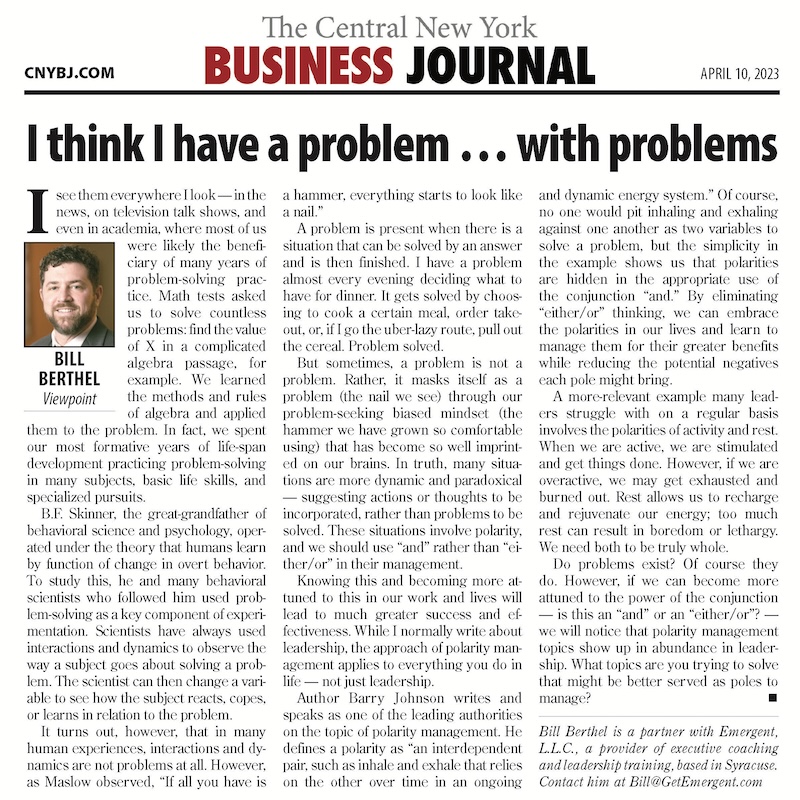I see them everywhere I look – in the news, on television talk shows, and even in academia, where most of us were likely the beneficiary of many years of problem-solving practice. Math tests asked us to solve countless problems: find the value of X in a complicated algebra passage, for example. We learned the methods and rules of algebra and applied them to the problem. In fact, we spent our most formative years of life-span development practicing problem-solving in many subjects, basic life skills, and specialized pursuits.
B.F. Skinner, the great-grandfather of behavioral science and psychology, operated under the theory that humans learn by function of change in overt behavior. To study this, he and many behavioral scientists who followed him used problem-solving as a key component of experimentation. Scientists have always used interactions and dynamics to observe the way a subject goes about solving a problem. The scientist can then change a variable to see how the subject reacts, copes, or learns in relation to the problem.
It turns out, however, that in many human experiences, interactions and dynamics are not problems at all – yet as Maslow observed, “If all you have is a hammer, everything starts to look like a nail.”
A problem is present when there is a situation that can be solved by an answer and is then finished. I have a problem almost every evening deciding what to have for dinner. It gets solved by choosing to cook a certain meal, order take-out, or, if I go the uber-lazy route, pull out the cereal. Problem solved.
But sometimes, a problem is not a problem. Rather, it masks itself as a problem (the nail we see) through our problem-seeking biased mindset (the hammer we have grown so comfortable using) that has become so well imprinted on our brains. In truth, many situations are more dynamic and paradoxical – suggesting actions or thoughts to be incorporated, rather than problems to be solved. These situations involve polarity, and we should use “and” rather than “either/or” in their management.
Knowing this and becoming more attuned to this in our work and lives will lead to much greater success and effectiveness. While I normally write about leadership, the approach of polarity management applies to everything you do in life – not just leadership.
Author Barry Johnson writes and speaks as one of the leading authorities on the topic of polarity management. He defines a polarity as “an interdependent pair, such as inhale and exhale that relies on the other over time in an ongoing and dynamic energy system.” Of course, no one would pit inhaling and exhaling against one another as two variables to solve a problem, but the simplicity in the example shows us that polarities are hidden in the appropriate use of the conjunction “and.” By eliminating “either/or” thinking, we can embrace the polarities in our lives and learn to manage them for their greater benefits while reducing the potential negatives each pole might bring.
A more relevant example many leaders struggle with on a regular basis involves the polarities of activity and rest. When we are active, we are stimulated and get things done. However, if we are overactive, we may get exhausted and burned out. Rest allows us to recharge and rejuvenate our energy; too much rest can result in boredom or lethargy. We need both to be truly whole.
Do problems exist? Of course they do. However, if we can become more attuned to the power of the conjunction – is this an “and” or an “either/or”? – we will notice that polarity management topics show up in abundance in leadership. Two current topics that come to mind are the concepts of working from home and working in-office and growing/retaining and buying/attracting talent; what topics are you trying to solve that might be better served as poles to manage?
This Viewpoint originally appeared in the Central New York Business Journal on April 10, 2023.
Bill Berthel is a partner with Emergent, L.L.C., a provider of executive coaching and leadership training, based in Syracuse. Contact him at Bill@GetEmergent.com

Comments (0)